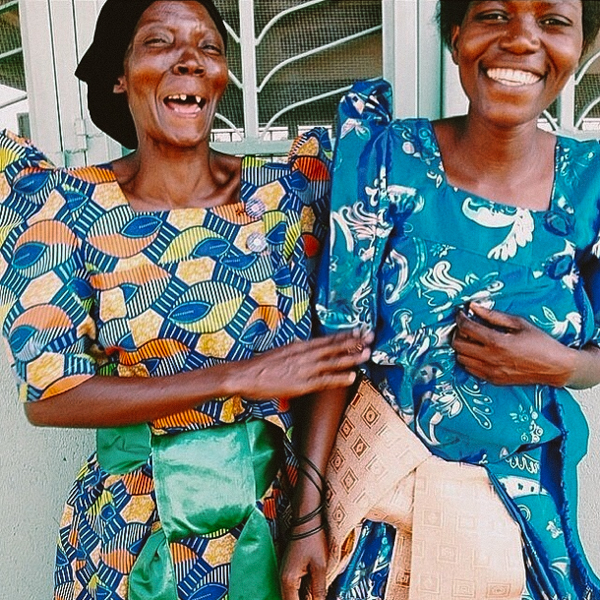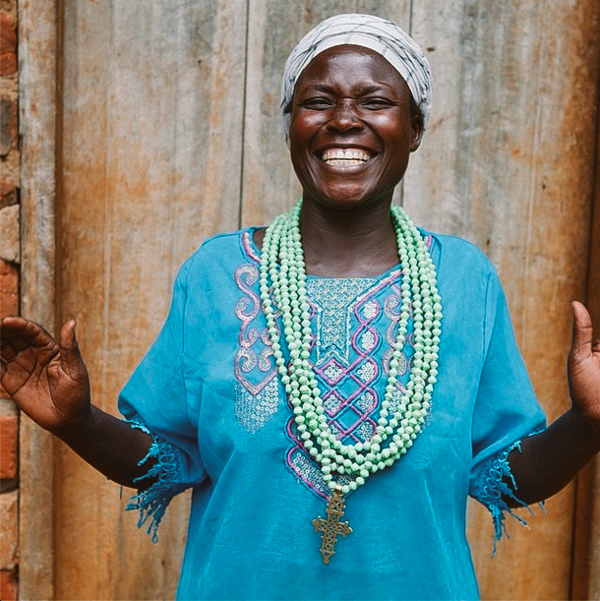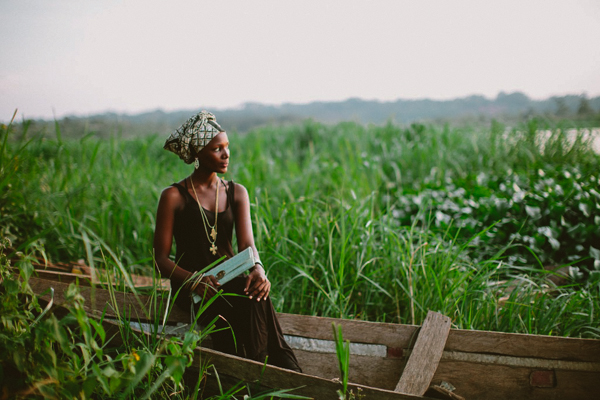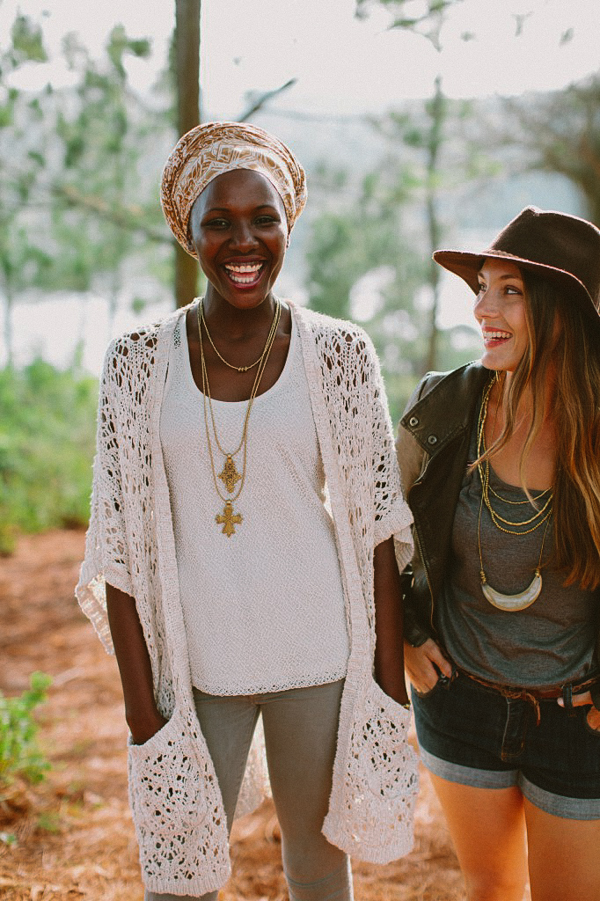10 Year Journey in Africa // Interview with Brittany Merrill Underwood, Founder of The Akola Project
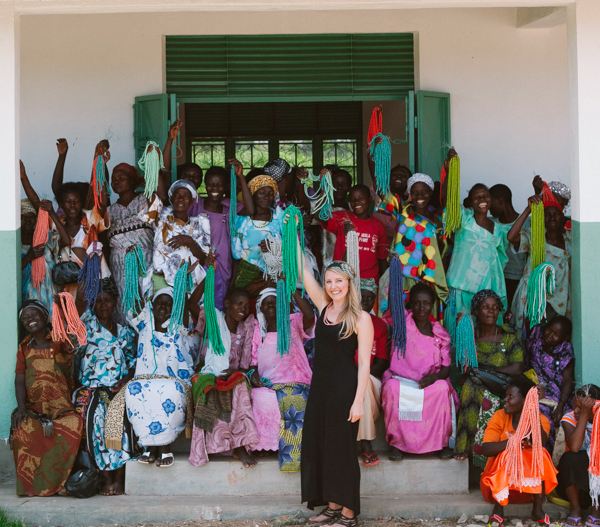
Images courtesy of The Akola Project
It was in 2004, when Brittany Merrill Underwood, founder of the Akola Project, experienced change in her life forever. Brittany, a college student who was unsure of how to respond to a third world environment found herself creating a social business that today has impacted over 250 women and 2500 children in Uganda. Her efforts include building a three-story orphanage home, drilling 23 clean water wells in displaced communities, and constructing two vocational training centers.
Brittany’s life changed when was deeply affected by Sarah’s story, a Ugandan woman who just three years older than Brittany lived up the dirt road and housed 24 street children. Sarah would even sacrifice her own meals to ensure the children would not starve. This story inspired Brittany’s 10-year journey in Africa.
After returning to the states upon meeting Sarah, she wanted to send a few hundred dollars to help her feed the children, and quickly learned that the orphaned children needed a building. The $100 turned into a $1 Million mission to build a three-story orphanage that would house 200 children. But for Brittany, she wanted to pursue an even larger impact, and so she set out to build an infrastructure that would support families and help over 2000 orphans, and through this infrastructure, she would help Ugandan women embrace their calling by becoming agents of transformation in their communities.
This infrastructure became the Akola Project, a global fashion brand that is fully made by and fully benefits marginalized women. Akola, which means ‘to work’, is a “sustainable way to support undereducated, marginalized women in unreached villages of Uganda, so they could support their families and, in turn, their entire communities.”
Brittany’s once burden now passion is taking her Akola Project model, global, by setting the bar for impact for social business and sustainability for non-profits.
So, you could imagine my excitement to connect with Brittany, in the midst of her International travel schedule, to learn how the Akola Project is giving opportunity to Ugandan women like I’ve never heard or seen before.
Read ahead to discover a woman that not only inspires, but a woman who is changing the course of impact for social businesses and citizens around the world. Brittany has done a job well done for humanity.
Q | Tell us about yourself and what the past 10 years of your life looked like? My journey began with a 10-minute meeting in a slum on the outskirts of Uganda’s capital city Kampala. I was a 19-year-old college student at Southern Methodist University. It was the summer of 2004 and I had promised two of my high-school friends that we would have a summer adventure. We decided to take teaching positions in a remote boarding school in Western Uganda on the border of Congo.
I was uncomfortable. It was hot. I did not know how to respond to a third world environment. I never had any desire to work in Africa. I did not have a heart to serve then in any capacity. A local pastor noticed my discomfort and my hard heart. He told me he wanted me to meet a woman that he thought would inspire me. I followed him up a windy dirt road to a small house where I met Sarah, a Ugandan woman who was not but three years older than I was, yet lived her life with great meaning and purpose as she sacrificed everything she had to open her doors to 24 street children who slept on her floor. Sarah explained there were times the children went without food, but she was proud that not a single child had died of starvation since they wandered into her home. Sarah told me she had full confidence that God would provide for the children even though she was poor herself and did not have the means.
I was shaken out of my complacency. Here I was, a girl who had been given everything but shared nothing with others, standing before a woman who had been given nothing but shared everything with others; sacrificing her food, security, and home so others could live. I gave Sarah the little money I had in my pocket to buy food and told her I would pray for her.
At first, it was a burden. It was strange that I only spent ten minutes with Sarah yet I remained so deeply affected by her story. I called an American missionary who worked in Uganda and asked him to locate Sarah and her children. His voice shook over the phone as he told me he had been praying for Sarah and that someone would come to help. I asked if I could send over a couple hundred dollars for food… he told me they needed a building.
So began my 10-year journey in Africa. It started with buying seven acres of land near Kampala to build a small house for Sarah’s 24 children. The “small house” quickly turned into a one million dollar vision to build a three-story orphanage to house 200 children in the area. I had never raised $100 before… much less one million dollars that I needed to complete the project. So, I flew to Uganda… filmed 9 hours of footage and created a fundraising video. As I edited hours and hours of stories from the children that slept on Sarah’s floor… what was once a burden… became compassion… and then a passion.
After starting a 501(c)(3) organization in the halls of SMU’s non-profit department, I moved to Uganda to see the orphanage built to completion in 2006. It was the most difficult and glorious season of my life. I watched as the orphanage grew in size from a foundation to a painted building. Some days, the orphans would miss school to help us paint or build a fence. They knew how important the building was for their livelihoods. The building was completed in 2009 and was featured nationally and internationally on CNN.
At the same we were overseeing the construction of the orphanage; we were drilling over 20 wells in communities that lacked access to clean water. As we traveled to different villages throughout the country, we were amazed by Ugandan women who cared for 10 + children in their homes. Like Sarah, they had a vision and hope for their families — they simply did not have the income to embrace their calling.
We discovered by training and employing 200 women and guaranteeing them a monthly income, we could care for 2,000 children – without building an orphanage. It was a way to make a greater impact. A model that was sustainable. It was a pathway to care for more orphaned children. It was a means to help other women facilitate their dreams. Once we handed the orphanage to Sarah’s local ministry in 2007, we launched a new sustainable model to uplift women and children. The women named it “Akola” which means “to work” in their local dialect.
Working in rural villages required our team to invest in infrastructure to support economic development. Akola Project began constructing two vocational centers in Eastern and Northern Uganda to support training and employment activities. In the meantime, our team worked to identify marginalized women in five villages who had the least support and most dependents. Our Akola team spent five years training and employing 250 women with no educational or vocational background to create high quality products to sell in the global marketplace. Training began with basic arithmetic to teach women to count beads strung on a necklace and culminated in leadership development. We also equipped Akola women with life skills and started savings and loans programs to help the women responsibly manage and invest their new earned income into local businesses.
In 2010, I moved back from Uganda to the US to get my masters degree in Intercultural Studies with an emphasis in International development. After five years in the field, I worked with the best development practitioners in the country to develop a sustainable impact model for women. The work paid off. Over the last seven years, the Akola Project has blossomed into a thriving social-business that empowers women. Akola jewelry has retailed in over 350 high-end boutiques throughout the nation and has been featured on the likes of the Today Show, Katie Couric, Entrepreneur and Fox-Small Business.
In 2014, we expanded our model of empowering women through training, income generation, and small business creation to Dallas. We are joining a holistic effort to rehabilitate women in our city by offering an economic alternative to women who have been trafficked. We now train and employ these women to staff our fulfillment center, creating a global brand that is made by, is run by and fully benefits marginalized women.
With a robust foundation built in Uganda, the social business has seen tremendous success and increasing demand in the US. The women in Uganda who first joined Akola in 2007 are now completing their empowerment cycle and starting local small businesses to provide sustainability for their local economies. These women are no longer dependent solely on Akola for employment, but have a thriving economy to pass down for future generations.
Q | As the creator of the Akola Project, what inspired this venture? I was inspired to build the Akola Project as a sustainable alternative to orphanage homes to empower women to care for orphans and disadvantaged children. After living in Uganda for several years, I learned that women like Sarah are culturally responsible for caring for orphaned and disadvantaged members of their communities. I observed the dilemma that women in rural villages face as they struggle to care for an average of 10+ child dependents. Although Ugandan women are culturally and economically marginalized, given the opportunity, they will do anything to provide for their child dependents as well as orphaned children in their community. In response, I launched the Akola Project, ‘to work’, in 2007 as a sustainable way to support undereducated, marginalized women in unreached villages of Uganda, so they could support their families and, in turn, their entire communities.
Sarah’s sacrifice motivated me to empower 250 women who have impacted the lives of 2,500 children who are in school and will have the capacity to change the lives of many others in their community.
Q | Can you tell us about the model you created to address the needs in the locations you work from and tell us a little more about what it is?
Akola Project is a non-profit organization that was founded in 2004 with a mission to empower women in Uganda.
Akola’s vision is a global brand that is fully made by and fully benefits marginalized women so they can become agents of transformation in their communities. Akola is pioneering a fusion model that operates a social business within a non-profit framework. This innovative model, which is being taught at the university level, allows Akola to invest in the infrastructure for economic opportunity, train women with no vocational background, and operate a successful business that supports Akola beneficiaries to earn income throughout the development process.
The mission of Akola is to empower marginalized women to transform the spiritual and physical livelihoods of their families and communities through economic development. To achieve its mission, Akola facilitates a unique culture of empowerment where women are trained to take ownership of the development process. By constructing vocational training centers to train and employ women with no educational or vocational background, Akola project has helped transform women’s relationships with God, themselves, and others. Akola women generate monthly income to meet the basic needs of 10+ child dependents and the ability to infuse capital into their local village economies. Additionally, true sustainability is achieved through Akola’s savings and loans programs. Akola women save 10 to 30% of their Akola income to start local businesses in their communities and thus to exponential opportunities for other families and generations to break the cycle of poverty themselves.
To generate employment opportunities through the social business, Akola has created a high-quality accessories brand that is sold in over 350+ high-end boutiques throughout the country.
Akola Project has had made an incredible impact over the past 10 years. Akola has invested in the holistic development of five villages in Eastern and Northern Uganda through constructing two training centers and drilling 23 clean water wells. 250 marginalized women have been trained in marketable skills such as loom weaving and jewelry production. In 2013, Akola women earned $142,516 in living wages to provide for their families basic needs. In addition, 63 women started local businesses using their Akola income to provide sustainability for years to come.
Akola Project is able to achieve its development and business goals through a robust team in Dallas, TX and Jinja, Uganda. Both offices are run by qualified COO’s and are overseen by the CEO and Board of Directors. Akola Uganda’s office has 30 staff members divided between three teams, a social business team, an operations team and an empowerment, education and ministry team. Akola Dallas’ office has 11 staff members on two teams, a logistics & operations team and a sales & development team to support Akola’s efforts in Uganda and the US.
Q | Tell us about the ladies you work with? Akola Project is committed to empowering women who have been oppressed by cultural and socio-economic inequalities. In Uganda, Akola women come from war-torn backgrounds, live in extreme poverty in remote locations and have limited access to formal education and employment opportunities. In Dallas, Akola trains and employs women rescued from the sex trafficking industry. The beauty of creating sustainable employment opportunities in these two regions is that it allows both groups of women to help each other re-write their own futures and the futures of their children.
AKOLA BENEFICIARIES
PRIMARY
Akola Project is committed to empowering marginalized women who have been oppressed by cultural and socioeconomic inequalities.
UGANDA
Women in Uganda are not recognized for their contributions to society. Women come from backgrounds of extreme poverty, live in rural villages, have limited access to formal education, and have not been given the opportunity to develop employable skills.
DALLAS
Akola employs women rescued from the sex trafficking industry in Dallas. These women have little education, and few employable skills. Akola Project provides a dignified work environment committed to vocationally training and professionally developing these women so they can maintain dependable employment.
SECONDARY
The Akola model was developed to sustainably impact orphaned and disadvantaged children in Uganda. The 7-10 child dependents of each Akola woman are secondary beneficiaries.
Since inception Akola women have sent 2,500 children to school and earned the money to buy medical care, food and shelter. In addition to having those basic necessities, children are growing up with role models who are no longer marginalized but thriving as skilled leaders and creative entrepreneurs in their communities. Akola’s goal is to put an end to the cycle of marginalization and poverty in rural villages.
TERTIARY
The rural Ugandan villages Akola serves are traditionally subsistence farmer communities with barter economies. However, the barter system is becoming antiquated, and Akola is infusing capital into these economies through the 250 Akola income earners. The community trusts Akola women, and neighbors come to them often for loans to take their sick children to the clinic.
The local subsistence farmers and shop owners are a tertiary benefactor category for Akola as they now have a market in these 250 women to sell their harvests to and customers with disposable income to purchase luxuries such as bicycles and soap.
Q | I know you are passionate about International Development. Why is it important to you? The current world crisis manifested by deteriorating economies, oppression, poverty, high levels of unemployment, and the HIV/AIDS epidemic requires us to respond with holistic global solutions. I believe that globalization presents unique opportunities for the economic development of the world’s poor. Microenterprise development programs have emerged as a practical and immediate solution to global challenges of poverty, unemployment, and underdevelopment in Africa. Transformational development involves helping the poor realize and experience their God-given potential in every aspect of their relationships – social, economic, spiritual, and political. I am passionate about international development in the form of microenterprise development because, done right, it has transformational results and helps the poor claim their freedom to grow and thrive.
Q | Any new projects coming up for Akola Project? Akola Project retails in over 350 high-end boutiques nationwide. Fall 2014, we are opening our first flagship store in Dallas! In 2015, Akola will launch its mass-market line through Dillard’s Department stores.
Q | You are about to kick off a column at Conscious Magazine to talk about International Development. Why is writing for Conscious important to you? Akola Project is trying to set the bar for impact for social business and sustainability for non-profits. I believe that writing for conscious magazine will give us a platform to educate the public on both!
Learn. Connect. Act.
Learn more about Akola Project
Connect via Facebook, Twitter, Instagram
Act by becoming an Akola Ambassador
From the Editor
At Conscious, we are inspired by remarkable people, and so we set out to tell stories that highlight real human interactions and human dignity. You can read more stories like this when you pick up your copy of Conscious Magazine. Subscribe today via our Conscious Shop and subscribe to Conscious Updates.

